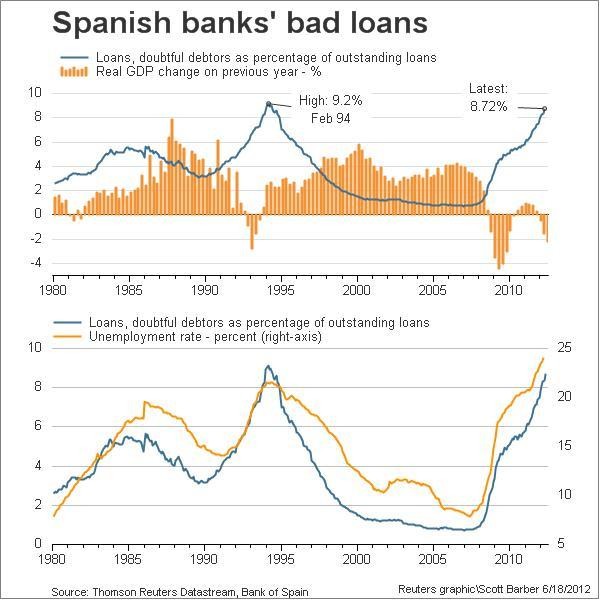Europe s banks could be in big trouble
Post on: 30 Июнь, 2015 No Comment

On August 28th the IMF’s new chief Christine Lagarde was bombarded with criticism after she insisted that Europe’s weakest banks need urgent recapitalization in order to curb contagion in the euro crisis. Her main critics were ECB president Jean-Claude Trichet and European Commissioner for Economic and Monetary Affairs Olli Rehn, who countered that Europe’s banks do not need liquidity or fresh capital. However, developments over the past month overwhelmingly support Ms Lagarde’s assertion. In both the peripheral and the core countries, European banks could really be in big trouble.
Mr Trichet and Mr Rehn’s main argument why European banks are reasonably healthy relies mainly on the stress tests that were conducted just over a month ago by the European Banking Authority (EBA). According to these stress tests, only nine out of 91 banks would see their Core Tier I Capital ratio fall under 5% under the stressed scenario. Mr Rehn has repeatedly highlighted that those banks that failed the stress tests are in the process of raising their capital levels by October anyhow. However, the assumptions made in the adverse scenario of the stress tests were a joke. For the most part, the adverse scenario conditions have already come to fruition and in some cases they have been surpassed. Furthermore, the banks did not reveal any of their risk weightings, making the stress test results difficult to interpret.
There have been several developments over the past month that support Ms Lagarde’s insistence that European banks need to be proactively recapitalized. Just looking at data from this week alone offers cause for concern. Bank stocks led the collapse of European stock indices on Monday, falling by 5-12%. (Deutsche Bank shares fell by 8% in a single day, Credit Suisse by 8.8% and UniCredit by 7.4%). Also on Monday, the ECB reported that it holds €166.8bn in its bank deposit facility, up by €15bn compared with the previous week and the highest amount since August 2010.
Problems in the periphery
First, there have been indications that some banks in the periphery may need to be recapitalized. The worst banking news in the periphery has come out of Greece over the past month. On August 25th, the Greek central bank activated an Emergency Liquidity Assistance (ELA) scheme to which Piraeus Bank requested access. The specific conditions for accessing Greek ELA funding remain unknown, but the Greek ELA scheme was reportedly modeled after that launched in Ireland, and its funding is more expensive than that from the ECB. Banks will only tap the Greek ELA scheme if they run out of eligible assets to use as collateral with the ECB. On August 29th a merger was announced between Alphabank and Eurobank in Greece with the backing of €500m of additional capital from Qatar. This merger went through in large part because these banks have been unable to raise capital in the markets.
Concerns in the core
Second, dismal banking news has not been constrained to the periphery. US money market funds announced they cut their exposure to euro area banks for the second month in a row in August. An important source of short-term financing to eurozone banks, some money market funds have reportedly avoided French banks in particular. There have been several recent woes for the French banking sector. In addition to a rumour-inspired sell off of Société Générale’s stocks that caused the bank’s share price to plummet in the first half of August, French institutions were heavily criticized by the International Accounting Standards Board (IASB). The IASB insisted that any institutions using mark to model valuations for their write-downs of Greek government debt acted inappropriately. BNP Paribas and French insurer CNP Assurances both used mark to model valuations, writing down Greek sovereign debt by only 21% (compared with over 50% by some financial institutions using mark to market valuations).
Risks ahead
There are two clear and present dangers in the short-term that could spell more trouble for European banks. The first relates to the private sector involvement (PSI) of the second Greek bailout. Private investors have until tomorrow to tell their national regulators if they will participate in the scheme. Currently around 70% of private investors have said they will volunteer for PSI. The Greek government has said that it will only feel obliged to participate if 90% of investors volunteer. Without PSI, the next tranche of funding to Greece (around €8bn) could be halted, and a much bigger haircut than the envisaged 21% could be imposed.
The second significant risk for European banks is related to growth. Euro area growth roughly stalled in the second quarter of 2011, with each European indicator released looking gloomier than the last. Forward looking economic indicators in the US have been discouraging recently as well. Several economists have raised the alarm on a double dip recession, or a continued downturn. However you’d like to coin the GDP contraction we may be facing in the eurozone and the US, it does not bode well for Europe’s banks.














